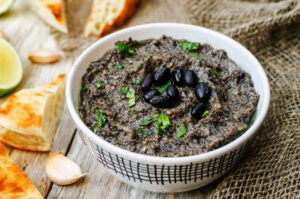You punch the numbers and log the foods, but nothing seems to be happening… You’re not losing weight. Why isn’t calorie counting working?
In theory, calorie counting makes sense – it’s math afterall. Burn more calories than you eat, and you should lose weight, right? Well, not exactly.
It’s a common answer to the question “how do I lose weight?”, but calorie counting isn’t the answer you’ve been looking for. It gives you is a false sense of control and denies you the opportunity to practice intuitive eating.
Calorie counting isn’t the answer.
Read on to learn more.
Why Calorie Counting Doesn’t Work
We get it. Calorie counting sounds like the perfect answer. But it’s not surprising that many people have tried, and failed, to lose weight by calorie counting. If that sounds like you, you’re not alone. Unfortunately, calorie counting can do more harm than good. Here are several reasons why calorie counting doesn’t work.
It Isn’t Practical
Let’s be honest, is it even possible to track every single bit of food or drink we eat in a day? And what happens when the food item doesn’t register on the calorie tracking app? What if the food item is a little bigger or smaller than the app says? Moreover, how does it make us feel when we’ve gone over our allotted calorie count for the day?
We’re set up for failure, and then we’re back to square one. Judging ourselves and afraid to try again. Tracking every single calorie we consume is far from practical and slip-ups can make us feel like a failure.
Can Lead to Disordered Eating Behaviors
Counting calories not only feels restrictive, but it can be very inaccurate. Calorie-counting apps are only as good as the inputs they receive. In the same breath, they’re only accurate when you measure and weigh and count every bit of the food you’re consuming. Talk about labor intensive.
Maybe we lose a little weight at the beginning and feel hopeful. But soon, we end up confused because we didn’t continue to lose the weight we (theoretically) should have. Maybe we even gained weight.
The “solution”?
Aggressively slashing calorie intake. More restrictive eating. It’s a breeding ground for unhealthy and disordered eating behaviors.
Can’t Fight Biology
The age-old guidance of “eat less” may not suit every body type – biological factors like metabolic predisposition and genetic predisposition can have a significant impact. That’s why weight loss needs to be personalized to every individual, rather than a one-size-fits-all solution.
These predispositions may impact the way our bodies metabolize carbohydrates. On top of that, if there are any medical conditions at play – like an underactive thyroid, PCOS, or diabetes – weight loss may require medical guidance and/or supervision.
Disconnects you from your body
When we focus on the number of calories we consume, we forget to take stock of what we are fueling our bodies with. Mindless eating based on a trivial allotment of calories disconnects us from our bodies. It distances us from understanding our hunger and satiety signals. Intuitive eating is a powerful tool that helps us tap into the true needs of our bodies to fuel them properly – calorie counting negatively impacts that relationship.
Nutrition to the Wayside
The type of food you eat matters. Calorie counting overlooks the need for nourishing, whole foods in our diet. It encourages us to seek the lowest-calorie foods so that we can meet our goals, but this has a negative twist to it.
We often reach for highly processed foods that cater to low-calorie diets. These foods typically lack the level of nutrients that we can expect from a well-rounded, whole-food approach to healthy eating. So while we might be hitting our calorie count for the day, these foods often leave us hungry and nutrient deficient.
Why You Aren’t Losing Weight With Calorie Counting
So you’ve cut your calories and you’re tracking them to the T, but the weight just isn’t coming off the way you’d like it to.
You might be carefully counting your calories, but as we mentioned above, it’s not as simple as the math makes it seem. There are many factors that make it hard to lose weight and keep it off. These include genetics, medical conditions, stress, alcohol consumption, and unrealistic expectations. The best way to lose weight is through an overall approach to a healthy lifestyle. It starts with a shift in your mindset, allowing everything else to fall into place.
What works for us today may not work tomorrow. This is why mindset and the willingness to “Tri” something new is so important.
Note: If your doctor has you on a calorie deficit plan, it’s for a relevant reason. Always consult the advice of a healthcare professional.
Fresh Tri vs. Calorie Counting
There are so many ways that we can go about losing weight that doesn’t require tracking every bit of food we consume. The performative mindset associated with it leads us to failure and a fear of trying again. For good reason, too! We’ve been sold the idea that it should work. So when it doesn’t go as planned, we feel like we’ve failed.
When we feel this way, our habenula kicks in. It discourages us from attempting something again that made us feel awful. The lateral habenula is a tiny structure in the brain that sits above the thalamus. It is our motivation kill-switch.
Over-focusing on this small behavior of counting calories misses a critical piece of successful weight loss. We need to retrain our brains to create healthy habits around food and weight loss. Instead of our brains fighting us, take the pressure off. Allow ourselves the space to find a solution that works best for us. Start with something small, called a “Tri”, and then practice it until it becomes a habit.
Introducing the Iterative Mindset Method™
Wellbeing is a lifelong pursuit and doesn’t end when you’ve reached your weight loss goals. But it first begins with a shift in mindset. Once we understand that there is no shame in where we’re at, we can leverage the Iterative Mindset Method™.
With the Iterative Mindset Method™ we can get off the hamster wheel of diet culture. The three step approach is revolutionary and harnessing the power of it can be life changing. All you have to do is “Tri”.
We have to start by assessing where we’re at and accepting it as fact. Ask yourself what you want to achieve and how you want to feel. Check in with yourself daily and ensure you’re meeting your goals, not the goals anyone else may expect of you.
Up next is where the magic happens. Iteration is the process of tweaking, adjusting, or changing an element of your behavior or your environment based on what you assessed. If something feels misaligned, acknowledge it and pivot. Making these small adjustments can prevent us from throwing in the towel. We can maintain the proper mindset for success.
For example, the coffee creamer that we pour with a heavy hand every morning… It is full of preservatives that we’re likely better off avoiding. Tomorrow morning, we can try omitting it altogether, or buying a “cleaner” version. That’s an iteration.
Finally, we practice our new habits. One by one we build positive habits that help us reach our goals. We try a new habit out, and we assess how it feels. Does this work for me? If not, iterate and try something new. Because iterators never fail.
Stop Calorie Counting: Start Tri-ing
No one deserves to go through life feeling like a failure. Especially in the life-long pursuit of health and wellbeing. Do something different and start Tri-ing. The Iterative Mindset Method™ frees you from the chains of calorie counting. It helps you build positive life-long habits that guide you toward your best self. Download the FreshTri App today and iterate your way to health and wellness.













